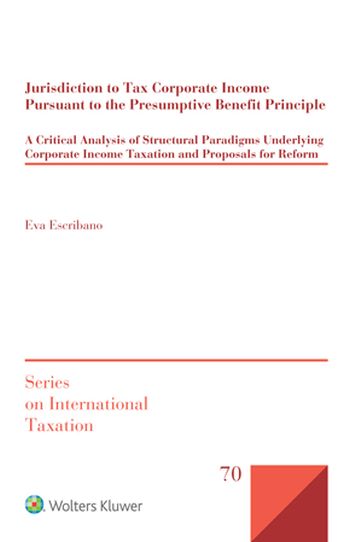Jurisdiction to Tax Corporate Income Pursuant to the Presumptive Benefit Principle: A Critical Analysis of Structural Paradigms Underlying Corporate Income Taxation and Proposals for Reform
ISBN13: 9789403506401
Published: May 2019
Publisher: Kluwer Law International
Country of Publication: The Netherlands
Format: Hardback
Jurisdiction to Tax Corporate Income Pursuant to the Presumptive Benefit Principle intends to demonstrate that the profit shifting phenomenon (e.g., the ability of companies to book their profits in jurisdictions other than those that host their economic activities) is real, severe, undesirable, and above all, the natural consequence of both the preservation of three fundamental paradigms that have historically underlain corporate income taxes and their precise legal configuration. In view of this, the book submits a number of proposals in relation to the aforementioned paradigms and in the light of the suggested “presumptive benefit principle” so as to counteract profit shifting risks and thus attain a more equitable allocation of taxing rights among States.
What’s in this book:
This book provides a disruptive discourse on tax sovereignty in the field of corporate income taxation that endeavors to escape from long-standing tax policy tendencies and prejudices while considering the challenges posed by a globalized (and increasingly digitalized) economy. In particular, the book offers an innovative perspective on certain deep-rooted paradigms historically underlying corporate income taxation:
- tax treatment of related parties within a corporate group along with the arm’s-length standard;
- corporate tax residence standards; and
- definition of source for corporate income tax purposes, with a particular emphasis on the permanent establishment concept.
The book explores their respective origins, supposed tax policy rationales, structural problems and interactions; ultimately showing how the way tax jurisdiction is currently defined through them inherently tends to trigger profit shifting outcomes. In view of the conclusions of the study, the author suggests the use of a new version of the traditional benefit principle (the “presumptive benefit principle”) that would contribute to address the profit shifting phenomenon while serving as a practical guideline to achieve a more equitable allocation of taxing rights among jurisdictions. Finally, the book submits a number of proposals inspired by the aforementioned guideline that aspire to strike a balance between equity, effectiveness and technical feasibility. They include a new corporate tax residence test and, most notably, a proposal on a new remote-sales permanent establishment.
